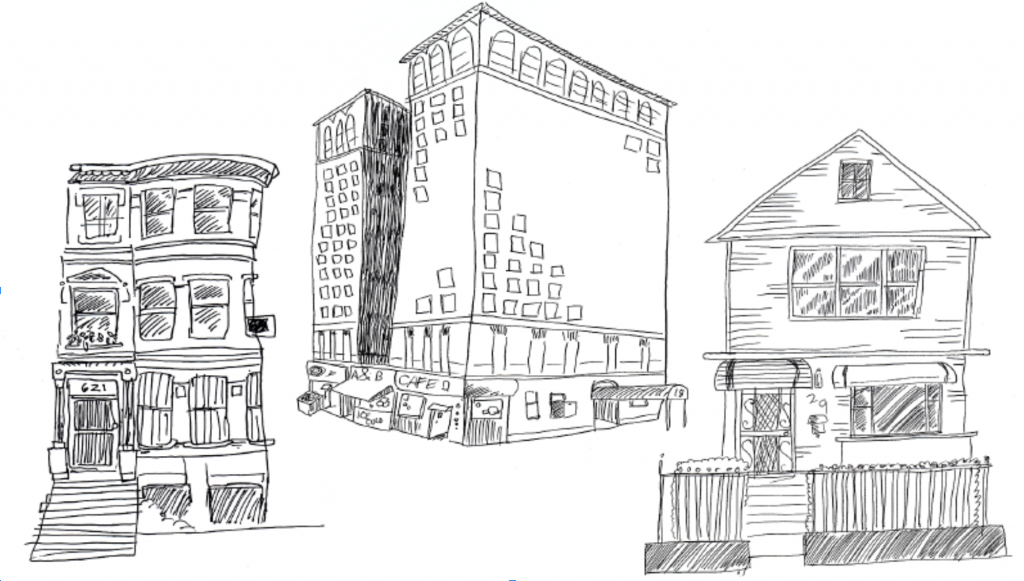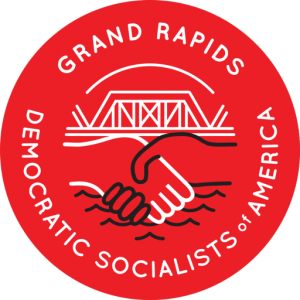For several local non-profits, community land trusts are a driving force in addressing the imminent housing crisis.

This blog originally appeared in the November 2020 edition of What’s Left; the GRDSA newsletter
Rather than financing private development with no interest in the community, several local nonprofits have proposed a new approach to the city’s imminent housing crisis: community land trusts. In Grand Rapids, the need for homes is barrelling towards levels unmanageable. According to a recent housing study, the city requires 9,000 more housing units by 2025 to satisfy demand. Yet, the city housing commission has been apathetic to the issue, and lower-income residents are being displaced as a result.
A community land trust is a city-invested development controlled by the city and its constituents. A plot of land is purchased by the city for low-income housing, and the homes—not the land—are sold at an affordable price with low down-payments and without private mortgage insurance. The homeowners save on property costs while building equity.
Home equity is a lucrative strategy for building wealth but is unattainable for individuals who cannot afford a home, thereby perpetuating the cycle of poverty. When the home is sold, the homeowner receives a portion of the profits to reinvest, including 100% of the equity from their mortgage. The housing remains affordable because the low-income requirements are contracted.
Price is the most significant barrier for homeownership and a major driving factor in the housing crisis in Grand Rapids. Housing prices have risen with demand, but wages and economic opportunities have not adjusted on the same scale. Those at or near poverty are affected most, especially as the wealth disparity in the United States widens. The federal minimum wage has not increased from $7.25 since 2009 despite the sharp increase in the cost of living.
In 2017, the median income in Grand Rapids was $44,369, and the median property value was $121,800 (datausa.io). Twenty-five percent of the population lived at or below the federal poverty level ($24,600 for a four-family home). Today, the average property value in Grand Rapids is about $181,000 (zillow.com).
The GR Housing Commission has only exacerbated the issue. Due to mismanagement, the commission has been neglected while the manager sold many remaining properties for profit. They’ve swindled public funds and fermented a crisis in which they will not address.
In the past five years, the commission’s primary focus has been increasing Section 8 Project-Based housing. According to the GRHC 2020-2024 Five-Year Plan, the commission funded the development or improvement of rental housing only in the past five years, including $2.5 million in improvements to two retirement communities and $1.4 million in low-income housing tax credits (LIHTC) in support of a planned 50-unit development. For the next four years, the commission plans to increase Section 8 Homeownership program participation by 30 households.
The commission’s response shows a complete lack of concern for the hundreds of individuals it will leave homeless. Rental housing can be predatory and supports private investors, not the community. A renter has no opportunity to build wealth, and low-income developments often displace individuals from the area. In the long term, rental housing magnifies the issue of poverty and housing inequality.As people of color are most impacted by wealth inequality, affordable homeownership is also necessary if we are to confront systemic racism in our community.
The historic prevalence of racism in Grand Rapids homeownership—specifically through redlining and generational wealth—has evolved, but prevails nonetheless. Although initiatives have formed to address the city’s current housing crisis, the underlying racial disparity remains largely unaddressed.
Take, for example, Grand Rapids’ Third Ward, located in the Southeast portion of the city and with around a third of the population, many of whom are black. According to the city supported private development projects dashboard, from 2012-17 the area received 1.5 percent of the $1.29 billion in private investments supported by Grand Rapids’ economic development programs, or about $19.4 million. The First and Second Wards received $750 and $560 million, respectively. In 2017 alone, the Third Ward had no private investments, which equated to zero new jobs or housing. In total, thirty-six housing units were built in the ward in five years compared to the 2,743 in the First and Second combined.
In 2017, the unemployment and poverty rates in Grand Rapids were highest among black and Hispanic communities. A plan of action to solve a housing crisis can take many forms; however, without addressing racism—the root cause of housing injustice—the crisis will persist. Housing equality is more than placing individuals into homes. The social and economic factors must be a focus as well.
There are over two-hundred community land trusts across the nation, such as Champlain Housing Trust, which was established over thirty years ago. In addition to affordable homeownership, community land trusts aim to equip the homeowners with the necessary skills and a community to rely on.
With nearly $10 million in private grants and investments, the Inner City Christian Foundation (ICCF) purchased 248 homes in 2017-18 to build a Community Homes Land Trust in Grand Rapids over the next ten years. However, the non-profit corporation’s platform is inadequate as nearly all underlying issues of housing injustice are ignored. Their website states, “The dynamics in today’s hot housing market are very different than they were in preceding decades, when urban neighborhoods were too often characterized by disinvestment and discrimination. Today, the chief concern in urban neighborhoods is not disinvestment but displacement caused by rapidly escalating prices and rents.” The idea that racism does not still affect homeownership is untrue. While the initiative points in the right direction, the ICCF must be more assertive to be successful. Currently, the plan is meek and lacks substance.
The Grand Rapids Entire Community Housing Trust Organization (GRECHTO) is another local organization with plans to build a housing trust in the area. The initiative is in the early stages and welcomes suggestions from the community.
Community land trusts keep wealth within the community. The city receives a return on investment, and the homeowner profits from paying a mortgage. Similar to many socialist-leaning projects, supporters of community land trusts acknowledge the systemic issues lending to poverty and community destitution and denounce capitalist exploitation. It is important to note that land trusts act as an intermediary in a state of crisis, but the end goal includes the complete renovation of city planning, as housing should not be a for-profit enterprise. For more information on community land trusts, please visit the GRECHTO website.
